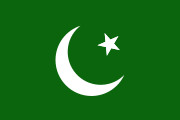
Back رابطة مسلمي عموم الهند Arabic Bütün Hindistan Müsəlman Liqası Azerbaijani Мусульманская ліга Byelorussian নিখিল ভারত মুসলিম লীগ Bengali/Bangla Lliga Musulmana Catalan Muslimská liga Czech All India Muslim League Danish Muslimliga German Tuthindia Islama Ligo Esperanto Liga Musulmana Spanish
All-India Muslim League | |
|---|---|
| President | See List of presidents of the All-India Muslim League |
| Historical Presiding Leader(s) | Muhammad Ali Jinnah Aga Khan III A. K. Fazlul Huq Nawab Waqar-ul-Mulk Kamboh Huseyn Shaheed Suhrawardy Sir Feroz Khan Noon Khwaja Nazimuddin Liaquat Ali Khan Khaliq-uz-Zaman Mohammad Ali Bogra Shabbir Ahmad Usmani Abul Mansur Ahmed Ibrahim Rahimtoola Sardar Abdur Rab Nistar |
| Founder | Khwaja Salimullah |
| Founded | 30 December 1906, Dacca, British India (now Dhaka, Bangladesh) |
| Dissolved | 15 December 1947[1] |
| Succeeded by | ML IUML |
| Headquarters | Lucknow |
| Newspaper | Dawn |
| Student wing | All India Muslim Students Federation |
| Paramilitary wing | Muslim National Guard[2] |
| Ideology | Pakistani nationalism Muslim nationalism Islamic modernism[3] Conservativism Two-nation theory Separatism[4] |
| Political position | Right-wing |
| Religion | Islam |
| International affiliation | All-India Muslim League (London Chapter) |
| Election symbol | |
Crescent and Star  | |
| Party flag | |
 | |
The All-India Muslim League (AIML) was a political party established in Dhaka in 1906 when some well-known Muslim politicians met the Viceroy of British India, Lord Minto, with the goal of securing Muslim interests on the Indian subcontinent.[5]
The party arose out of the need for the political representation of Muslims in British India, especially during the Indian National Congress-sponsored massive Hindu opposition to the 1905 partition of Bengal. During the 1906 annual meeting of the All India Muslim Education Conference held in Israt Manzil Palace, Dhaka, the Nawab of Dhaka, Khwaja Salimullah, forwarded a proposal to create a political party which would protect the interests of Muslims in British India. Sir Mian Muhammad Shafi, a prominent Muslim leader from Lahore, suggested the political party be named the 'All-India Muslim League'. The motion was unanimously passed by the conference, leading to the official formation of the All-India Muslim League in Dhaka.[6] It remained an elitist organization until 1937, when the leadership began mobilising the Muslim masses, which turned the league into a popular organization.[7][8]
In the 1930s, the idea of a separate nation-state and influential philosopher Sir Muhammad Iqbal's vision of uniting the four provinces in North-West British India further supported the rationale of the two-nation theory. When the Congress party effectively protested against the United Kingdom unilaterally involving India in World War II without consulting the Indian people, the Muslim League went on to support the British war efforts. The Muslim League played a decisive role in the 1940s, becoming a driving force behind the division of India along religious lines and the creation of Pakistan as a Muslim state in 1947.[9]
After the Partition of India and the establishment of Pakistan, the All-India Muslim League was formally disbanded in India. The League was officially succeeded by the Pakistan Muslim League, which eventually split into several political parties. Other groups diminished to a minor party, that too only in Kerala state of India. In Bangladesh, the Muslim League was revived in 1976, but it was reduced in size, rendering it insignificant in the political arena. In India, a separate independent entity called the Indian Union Muslim League was formed, which continues to have a presence in the Indian parliament to this day.
- ^ The Muslim League: a progress report. www.himalmag.com. 1 February 1998.
- ^ Sajjad, Mohammad (2014). Muslim Politics in Bihar: Changing Contours. Routledge. ISBN 9781317559818.
- ^ "Atheist Fundamentalists". The Times of India.
- ^ Keen, Shirin (1998). "Partition of India". Emory University. Retrieved 9 February 2019.
- ^ "Establishment of All India Muslim League". Story of Pakistan. June 2003. p. 1. Retrieved 14 February 2014.
- ^ "Muslim League – Banglapedia".
- ^ Cite error: The named reference
Rizvi2000was invoked but never defined (see the help page). - ^ Keay, John (2000). India: A History. Atlantic Monthly Press. p. 468. ISBN 978-0-8021-3797-5.
Heavily supported by mainly landed and commercial Muslim interests ... they duly consummated this distrust [of Congress] by forming the All India Muslim League.
- ^ Jalal, Ayesha (1994). The Sole Spokesman: Jinnah, the Muslim League, and the Demand for Pakistan. Cambridge University Press. p. 4. ISBN 978-0-521-45850-4.
In 1940, ... [the A.I.M.L.] formally demanded independent Muslim states, repudiating the minority status which separate representation necessarily entailed, and instead asserted that Muslims were a nation ... The claim was built upon the demand for 'Pakistan'. But from first to last, Jinnah avoided giving the demand a precise definition.
© MMXXIII Rich X Search. We shall prevail. All rights reserved. Rich X Search